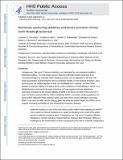Membrane anchoring stabilizes and favors secretion of New Delhi metallo-β-lactamase
Author(s)
González, Lisandro J; Bahr, Guillermo; Bonomo, Robert A; Vila, Alejandro J; Nakashige, Toshiki George; Nolan, Elizabeth Marie; ... Show more Show less
DownloadMembrane-anchoring.pdf (1.196Mb)
PUBLISHER_POLICY
Publisher Policy
Article is made available in accordance with the publisher's policy and may be subject to US copyright law. Please refer to the publisher's site for terms of use.
Terms of use
Metadata
Show full item recordAbstract
Carbapenems, 'last-resort' β-lactam antibiotics, are inactivated by zinc-dependent metallo-β-lactamases (MBLs). The host innate immune response withholds nutrient metal ions from microbial pathogens by releasing metal-chelating proteins such as calprotectin. We show that metal sequestration is detrimental for the accumulation of MBLs in the bacterial periplasm, because those enzymes are readily degraded in their nonmetallated form. However, the New Delhi metallo-β-lactamase (NDM-1) can persist under conditions of metal depletion. NDM-1 is a lipidated protein that anchors to the outer membrane of Gram-negative bacteria. Membrane anchoring contributes to the unusual stability of NDM-1 and favors secretion of this enzyme in outer-membrane vesicles (OMVs). OMVs containing NDM-1 can protect nearby populations of bacteria from otherwise lethal antibiotic levels, and OMVs from clinical pathogens expressing NDM-1 can carry this MBL and the bla[subscript NDM] gene. We show that protein export into OMVs can be targeted, providing possibilities of new antibacterial therapeutic strategies.
Date issued
2016-05Department
Massachusetts Institute of Technology. Department of ChemistryJournal
Nature Chemical Biology
Publisher
Nature Publishing Group
Citation
González, Lisandro J et al. “Membrane Anchoring Stabilizes and Favors Secretion of New Delhi Metallo-β-Lactamase.” Nature Chemical Biology 12.7 (2016): 516–522.
Version: Author's final manuscript
ISSN
1552-4450
1552-4469